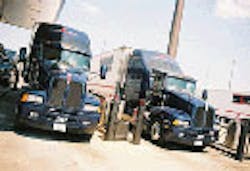Despite a precipitous decline in the price of diesel over the last four months – from a national average of $4.76 per gallon in July to $3.28 this week – fuel costs remain a big burden on the bottom line for many fleets.
“Declining diesel fuel prices improved our ability to more adequately collect fuel surcharges,” said Kevin Knight, chairman & CEO of Phoenix, AZ-based Knight Transportation, in the TL carrier’s third quarter earnings statement.
“But despite the decline in fuel prices, the U.S. Department of Energy national average diesel fuel price for the [third] quarter of $4.34 increased $1.44 above the third quarter of 2007 average of $2.90,” he said. “We continue to focus on improving the fuel efficiency of our fleet through reduced empty miles, decreased idle time, improved fuel purchasing, and controlling out-of-route miles.”
Heartland Express said it experienced a 46.5% increase in average fuel costs per gallon in the third quarter of 2008 compared to the third quarter last year, with its cost per gallon averaging $4.03 compared to $2.75 in the same quarter in 2007. For the first nine months of 2008, Heartland experienced a 50.2% increase in average fuel costs, with its cost per gallon averaging $3.86 versus $2.57 over the same period last year.
As a result, the TL carrier said it continues to stress its fuel cost controlling initiatives, such as taking advantage of bulk purchases where it is cost effective to do so when compared to over-the-road purchases, reducing tractor idle time and controlling out-of-route non-billable miles.
Werner Enterprises noted in its third quarter earnings statement that, over the past several years, the truckload industry has not recovered all of the cost of rising fuel prices through fuel surcharge programs. Each year in the past four years, rising fuel costs (net of fuel surcharge collections) had a negative impact on its operating income when compared to the previous year, with the total negative impact Werner’s operating income due to fuel expense, from 2004 to 2007, totaling $61 million.
“When fuel prices rise rapidly, there is a negative earnings lag effect that occurs because the cost of fuel rises immediately and the market indexes that are used to determine fuel surcharges increase at a slower pace,” the carrier said in its earnings statement. “As a result, during these rising fuel price periods, the negative impact of fuel on the company’s financial results is more significant.”
Werner noted that the fuel price trend in third quarter 2008 was unusual, as fuel prices declined for most weeks during the quarter. In a period of declining fuel prices, the company said it generally experiences a temporary favorable earnings lag effect, since fuel costs decline at a faster pace than the market indexes used to determine fuel surcharge collections. This occurred during third quarter this year, enabling Werner to temporarily have lower net fuel expense, helping offset uncompensated fuel costs such as truck idling, empty miles, and out-of-route miles.
Yet all of those uncompensated fuel costs were higher in third quarter this year than the third quarter of 2007 due to the higher average fuel prices. “If fuel prices remain stable going forward, the company does not expect the temporary favorable trend to continue,” the carrier noted.
About the Author
Sean Kilcarr
Editor in Chief
Sean Kilcarr is a former longtime FleetOwner senior editor who wrote for the publication from 2000 to 2018. He served as editor-in-chief from 2017 to 2018.
